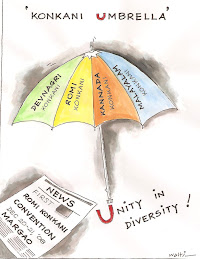Konkani bags Jnanpith, but the language community stands divided
25 Dec 2008, 0414 hrs IST, Raju Nayak, TNN
It was a parody of sorts for Goa's official language Konkani in 2008. While writer Ravindra Kelekar bagged the prestigious Jnanpith literary award, a first for Konkani, the language itself stood divided on script. On November 23, Kelekar, a writer credited with influencing the fight to make Konkani the state's official language, was declared the joint winner of the 42nd Jnanpith Award for the year 2006. However, at the award function at Ravindra Bhavan in Margao the shadow of a divided language fell on the ceremony.
While the Official Language Act recognises Konkani in Devanagiri script, there is a demand that Roman/Romi Konkani be included as well. In his speech at the function, Pundalik Naik, president of the Konkani Academy warned that if the Official Language Act was touched, it would set a bad precedent and the Konkani movement would not keep quiet. To understand the sentiment, one needs to step into history. The language movement, spread over six decades, has seen not just the production of literary works of repute in Konkani but the language's inclusion in the Sahitya Academy, the eighth schedule of the Constitution and the latest, the country's highest literary award. Since 1975, Konkani writers, many of them young, first-time writers, received Sahitya Academy awards. More importantly, Konkani shed its tag of being the literary monopoly of the higher strata of Goan society, mainly the Saraswat Brahmins, as accused by the Marathi protagonists.
"More and more writers from the Bahujan Samaj are coming up who produce literary works of high value. This is proof that the language movement has percolated and continues to strike deep into society," says award-winning writer Dilip Borkar. Pundalik Naik explains that after Goa's liberation in 1961, just like the Dalits in Maharashtra, Goan rural youth came out in large numbers to write in Konkani. "These rural folk had a different cultural background and they had different things to say, the literature was with force and aggressive," he says. "Prakash Vazrikar and Prakash Parienkar coming from remote Sattari taluka are the rarest of all and they have that unique distinct cultural ethos and style, which portrays a different rural life," Naik says.
Volvoi-native Naik, incidentally, himself created a separate rural' writing style when he entered the literary field, which at the time was dominated by urban writers like Chandrakant Keni, Uday Bhembre and Damodar Mauzo. Inevitably, he was the unanimous choice for convenor of the Konkani Prajecho Avaz, the organ that spearheaded the Konkani movement for official status for the language in 1985. Naik's fiery speeches enlightened youngsters, many of who started working for the language. "A plus point for the movement is that after the language agitation many Konkani kendras opened in rural areas and are still working for the language and culture," says writer N Shivdas. Another positive is that at the Goa University "the Konkani department gets the highest number of students in the language faculty," says Chandralekha D'Souza, head, Konkani department. She adds that while many of the students are from rural backgrounds, a number are Catholics "who have no difficulty with the Devanagari script," she says.
The reason for the specific mention of the community, is that those promoting the inclusion of Roman Konkani in the Official Language Act say that most Catholics are not familiar with the Devanagiri script. Naik asserts that not only do "Catholic students answer six papers in Konkani just like the rest of their classmates, writers Jofa Gonsalves, Petsi Pereira, Afusto Barreto and Gudalupe Dias have a distinct style and have attracted readers". "A speciality of these writers is that they don't have any influence of Marathi as they have no elementary training in that language. Their writings are the finest examples of a language's purity," says Naik. "The Konkani movement was secular, above communal and casteist barriers and gave our writers the courage to express themselves.
If the demand by Roman Konkani protagonists is for economic reasons or for (government) posts then the Konkani leadership can redress it suitably. If it is related to promoting Roman Konkani writers, this can be done in a big way too. But, if it is only on religious lines and if it promotes communal divisiveness, we will oppose it firmly," says Naik. Tomazinho Cardozo, noted tiatrist, however, contradicts Naik's view on the divide being communal, "Our country believes in unity in diversity. Goa has similar circumstances where scripts and dialects are for diversity and I feel the only way to unite Goans is by supporting the demand." Vincy Quadros, working president of the first Roman Konkani Meet, considered a soft-liner, says the demand for amendment is not echoed by the entire Catholic community. "Except for some MLAs and some writers there is no larger demand for a change in the Act. The present Act was passed as there was greater demand from all walks of life for the Devanagiri script," Quadros says.
Konkani activist Fr Mouzinho Ataide says the view that Catholics in large numbers support Roman Konkani is "not true". "Though it is claimed that Catholics support the Roman Konkani script nobody has any statistics and no effort has been made to ascertain their opinion," says Ataide.
"If one wants to ascertain opinion they have to talk to students studying in Konkani. We who never learnt Konkani should not comment on Konkani and force our opinion on others," says Fr Ataide.
Subscribe to:
Post Comments (Atom)


No comments:
Post a Comment